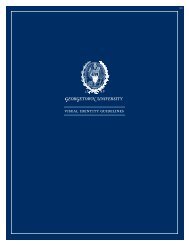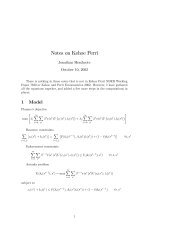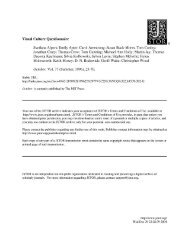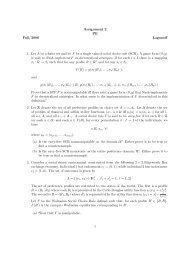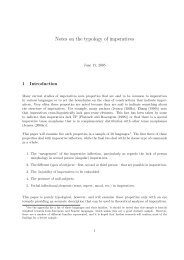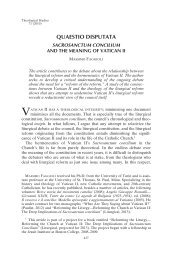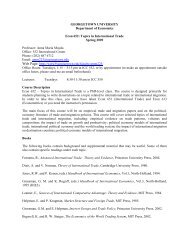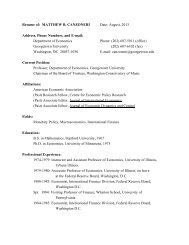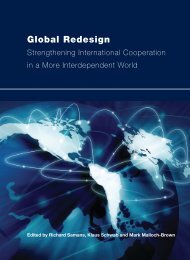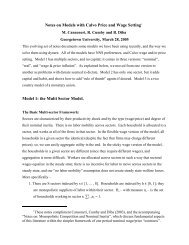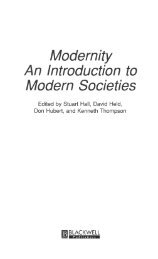Islam and the West: Annual Report on the State of Dialogue
Islam and the West: Annual Report on the State of Dialogue
Islam and the West: Annual Report on the State of Dialogue
You also want an ePaper? Increase the reach of your titles
YUMPU automatically turns print PDFs into web optimized ePapers that Google loves.
<str<strong>on</strong>g>Islam</str<strong>on</strong>g> <str<strong>on</strong>g>and</str<strong>on</strong>g> <str<strong>on</strong>g>the</str<strong>on</strong>g> <str<strong>on</strong>g>West</str<strong>on</strong>g>: <str<strong>on</strong>g>Annual</str<strong>on</strong>g> <str<strong>on</strong>g>Report</str<strong>on</strong>g> <strong>on</strong> <str<strong>on</strong>g>the</str<strong>on</strong>g> <strong>State</strong> <strong>of</strong> <strong>Dialogue</strong><br />
138<br />
Annex 1: Public Opini<strong>on</strong> <strong>on</strong> <str<strong>on</strong>g>the</str<strong>on</strong>g> <strong>State</strong> <strong>of</strong> Muslim-<str<strong>on</strong>g>West</str<strong>on</strong>g> <strong>Dialogue</strong><br />
In c<strong>on</strong>trast, Israelis give Muslims more credit:<br />
64% <strong>of</strong> Israeli resp<strong>on</strong>dents believe <str<strong>on</strong>g>the</str<strong>on</strong>g> Muslim<br />
world is committed to improving relati<strong>on</strong>s.<br />
Am<strong>on</strong>g Muslim majority nati<strong>on</strong>s surveyed, Saudi<br />
Arabia (68%) <str<strong>on</strong>g>and</str<strong>on</strong>g> Egypt (64%) are most likely<br />
to believe <str<strong>on</strong>g>the</str<strong>on</strong>g> Muslim world is committed to<br />
improving relati<strong>on</strong>s with <str<strong>on</strong>g>the</str<strong>on</strong>g> <str<strong>on</strong>g>West</str<strong>on</strong>g>. The <strong>on</strong>ly<br />
Muslim majority country in which most people<br />
do not believe <str<strong>on</strong>g>the</str<strong>on</strong>g> Muslim world is committed<br />
to improving relati<strong>on</strong>s with <str<strong>on</strong>g>the</str<strong>on</strong>g> <str<strong>on</strong>g>West</str<strong>on</strong>g> is Turkey,<br />
where <strong>on</strong>ly 26% agree while fully half (50%)<br />
say this is not <str<strong>on</strong>g>the</str<strong>on</strong>g> case. This is particularly<br />
noteworthy given that 64% <strong>of</strong> Turks say that<br />
<str<strong>on</strong>g>the</str<strong>on</strong>g> quality <strong>of</strong> interacti<strong>on</strong> between <str<strong>on</strong>g>the</str<strong>on</strong>g> <str<strong>on</strong>g>West</str<strong>on</strong>g>ern<br />
<str<strong>on</strong>g>and</str<strong>on</strong>g> Muslim worlds is important to <str<strong>on</strong>g>the</str<strong>on</strong>g>m. This<br />
may mean that many Turks regard Turkey as<br />
outside <str<strong>on</strong>g>the</str<strong>on</strong>g> so-called “Muslim world”. When in<br />
2005, Turkish residents were asked what <str<strong>on</strong>g>the</str<strong>on</strong>g>y<br />
admired least about <str<strong>on</strong>g>the</str<strong>on</strong>g> “Muslim world” some<br />
gave resp<strong>on</strong>ses like “women can’t drive,”<br />
signalling that <str<strong>on</strong>g>the</str<strong>on</strong>g>y were specifically talking<br />
about Saudi Arabia <str<strong>on</strong>g>and</str<strong>on</strong>g> not <str<strong>on</strong>g>the</str<strong>on</strong>g>ir own society 16 .<br />
• Do you think <str<strong>on</strong>g>the</str<strong>on</strong>g> <str<strong>on</strong>g>West</str<strong>on</strong>g>ern world is committed<br />
to improving relati<strong>on</strong>s between <str<strong>on</strong>g>the</str<strong>on</strong>g> <str<strong>on</strong>g>West</str<strong>on</strong>g>ern<br />
<str<strong>on</strong>g>and</str<strong>on</strong>g> Muslim worlds?<br />
Views <strong>of</strong> <str<strong>on</strong>g>West</str<strong>on</strong>g>ern commitment to improving<br />
relati<strong>on</strong>s form ano<str<strong>on</strong>g>the</str<strong>on</strong>g>r perceptual gap between<br />
both sets <strong>of</strong> countries. In all n<strong>on</strong>-Muslim<br />
countries – except Spain, Russia <str<strong>on</strong>g>and</str<strong>on</strong>g> Brazil –<br />
more people believe <str<strong>on</strong>g>the</str<strong>on</strong>g> <str<strong>on</strong>g>West</str<strong>on</strong>g> is committed to<br />
better relati<strong>on</strong>s than believe it is not committed.<br />
In c<strong>on</strong>trast, majorities in every Middle Eastern<br />
country studied disagree, while resp<strong>on</strong>dents in<br />
majority-Muslim Asian countries are about<br />
evenly split. Majorities in Israel (58%), <str<strong>on</strong>g>the</str<strong>on</strong>g> United<br />
<strong>State</strong>s (56%), Belgium (58%), Denmark (53%),<br />
<str<strong>on</strong>g>and</str<strong>on</strong>g> Italy (54%) think that <str<strong>on</strong>g>the</str<strong>on</strong>g> <str<strong>on</strong>g>West</str<strong>on</strong>g> is committed<br />
to improving relati<strong>on</strong>s between <str<strong>on</strong>g>the</str<strong>on</strong>g> <str<strong>on</strong>g>West</str<strong>on</strong>g>ern <str<strong>on</strong>g>and</str<strong>on</strong>g><br />
Muslim worlds. However, significant minorities<br />
in most n<strong>on</strong>-Muslim majority nati<strong>on</strong>s – including<br />
16 Gallup World Poll, 2005.<br />
17 Gallup Poll, April 2003, December 2006<br />
<str<strong>on</strong>g>the</str<strong>on</strong>g> United <strong>State</strong>s (40%), Spain (38%) <str<strong>on</strong>g>and</str<strong>on</strong>g><br />
Denmark (39%) – feel this is not <str<strong>on</strong>g>the</str<strong>on</strong>g> case.<br />
It is important to highlight how different events<br />
shaping public dialogue in each <strong>of</strong> <str<strong>on</strong>g>the</str<strong>on</strong>g>se nati<strong>on</strong>s<br />
shape resp<strong>on</strong>dents’ answers to this questi<strong>on</strong>.<br />
For instance, in US public discourse <str<strong>on</strong>g>the</str<strong>on</strong>g> war in<br />
Iraq has been a top agenda item for years.<br />
When <str<strong>on</strong>g>the</str<strong>on</strong>g> Gallup Organizati<strong>on</strong> asked Americans<br />
in April 2003, “All-in-all, do you think it was<br />
worth going to war in Iraq?” 73% said it was<br />
worth it. But when asked <str<strong>on</strong>g>the</str<strong>on</strong>g> same questi<strong>on</strong><br />
in December <strong>of</strong> 2006 <strong>on</strong>ly 37% said it was a<br />
good idea, while 62% disagreed 17 .Thisisan<br />
example <strong>of</strong> how, within each <str<strong>on</strong>g>West</str<strong>on</strong>g>ern nati<strong>on</strong>,<br />
public opini<strong>on</strong> <strong>on</strong> engagement with <str<strong>on</strong>g>the</str<strong>on</strong>g> Muslim<br />
world is both diverse <str<strong>on</strong>g>and</str<strong>on</strong>g> fluid.<br />
In Spain, resp<strong>on</strong>dents might be assessing <str<strong>on</strong>g>the</str<strong>on</strong>g><br />
US role as a de facto representative <strong>of</strong> <str<strong>on</strong>g>the</str<strong>on</strong>g><br />
<str<strong>on</strong>g>West</str<strong>on</strong>g> in engagement with <str<strong>on</strong>g>the</str<strong>on</strong>g> Muslim world,<br />
<str<strong>on</strong>g>and</str<strong>on</strong>g> thus assessing US commitment to<br />
improving relati<strong>on</strong>s, ra<str<strong>on</strong>g>the</str<strong>on</strong>g>r than commitment<br />
throughout <str<strong>on</strong>g>the</str<strong>on</strong>g> <str<strong>on</strong>g>West</str<strong>on</strong>g> per se. At <str<strong>on</strong>g>the</str<strong>on</strong>g> very least,<br />
<str<strong>on</strong>g>the</str<strong>on</strong>g> United <strong>State</strong>s is clearly understood to be<br />
<str<strong>on</strong>g>the</str<strong>on</strong>g> most significant <str<strong>on</strong>g>West</str<strong>on</strong>g>ern player in both <str<strong>on</strong>g>the</str<strong>on</strong>g><br />
Israeli-Palestinian c<strong>on</strong>flict <str<strong>on</strong>g>and</str<strong>on</strong>g> <str<strong>on</strong>g>the</str<strong>on</strong>g> war in Iraq –<br />
<str<strong>on</strong>g>the</str<strong>on</strong>g> two issues that occupy <str<strong>on</strong>g>the</str<strong>on</strong>g> most attenti<strong>on</strong><br />
in interacti<strong>on</strong>s between <str<strong>on</strong>g>the</str<strong>on</strong>g> <str<strong>on</strong>g>West</str<strong>on</strong>g> <str<strong>on</strong>g>and</str<strong>on</strong>g> <str<strong>on</strong>g>the</str<strong>on</strong>g><br />
Muslim world. Following <str<strong>on</strong>g>the</str<strong>on</strong>g> Madrid train<br />
bombings, <str<strong>on</strong>g>the</str<strong>on</strong>g>re was a backlash in Spain<br />
against <str<strong>on</strong>g>the</str<strong>on</strong>g> government <strong>of</strong> Jose Maria Aznar,<br />
as political rival Jose Luis Rodriguez Zapatero<br />
swept into power by persuading <str<strong>on</strong>g>the</str<strong>on</strong>g> public to<br />
draw a c<strong>on</strong>necti<strong>on</strong> between Spanish support<br />
for <str<strong>on</strong>g>the</str<strong>on</strong>g> Bush administrati<strong>on</strong> <strong>on</strong> Iraq <str<strong>on</strong>g>and</str<strong>on</strong>g> <str<strong>on</strong>g>the</str<strong>on</strong>g><br />
terrorist bombings in <str<strong>on</strong>g>the</str<strong>on</strong>g>ir homel<str<strong>on</strong>g>and</str<strong>on</strong>g>.<br />
It is likely that Danish resp<strong>on</strong>ses reflect <str<strong>on</strong>g>the</str<strong>on</strong>g><br />
debate sparked by <str<strong>on</strong>g>the</str<strong>on</strong>g> publicati<strong>on</strong> <strong>of</strong> <str<strong>on</strong>g>the</str<strong>on</strong>g><br />
carto<strong>on</strong>s perceived as defamatory to Muslims.<br />
In 2006, an opini<strong>on</strong> poll c<strong>on</strong>ducted throughout<br />
Europe found that about half <strong>of</strong> Danish



